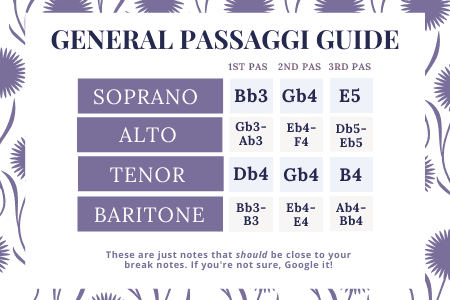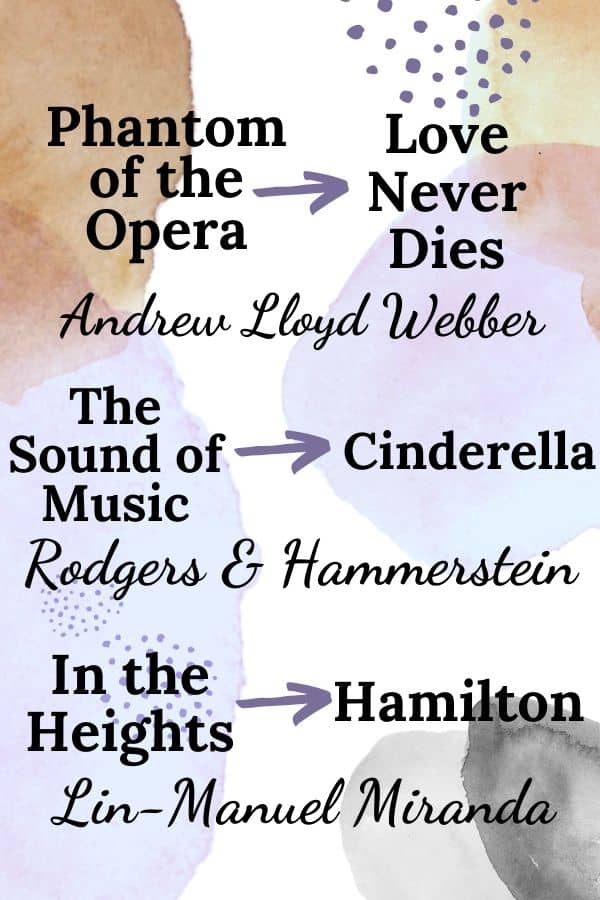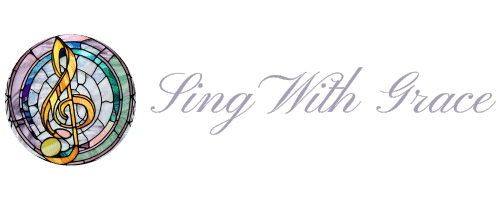Finally, it happens…a new audition call and requirements are posted. You are absolutely perfect for the lead role.
Score! Only one problem: none of the songs in your repertoire fit the detailed and (often!) obscure requirements!
“32 bars (up to 1 minute). Bring sheet music for your prepared pop/rock song or contemporary Broadway song.”
What? How do I know which style of music the director wants? Pop does not equal rock. So what do you do when you’re completely stumped for an audition song and the audition is in three days? I do not recommend waiting until the last minute on this!
You should start with the basics of what makes a musical theatre audition song successful. By following these 7 steps you can decide once and for all what is the BEST audition song to land you that dream role!
- Know Your Vocal Range
- Learn About the Musical
- Understand This Director’s Expectations of YOU
- Ask: What Role Do I Want?
- Understand that Dream Role
- Now You Search for that Musical Theatre Audition Song!
- PRACTICE!
I also have an audition song idea quiz to help you come up with ideas!
1. Know Your Vocal Range
You have to know what notes you can confidently sing before you choose your audition song. This is one of the most common mistakes I see at auditions and is 100% avoidable if you do some analysis of your vocal range.
If you aren’t sure what your voice part/ vocal range is, there are TONS of videos on Youtube that can help you out!
There is NOTHING worse for your audition confidence than choosing a song that you are not comfortable singing. If you are a female with a lower (alto) range you don’t want to be singing something soprano-y like “Glitter and Be Gay” from Candide.
Choosing a song that is well within your range is crucial. In an audition environment, the impact of nerves on your vocal performance could be huge. You are compared by the directors to the group of people you are singing in front of, and if you are not prepared with a song that fits your vocal ability, it will negatively affect your performance.
Some of these difficulties in an audition scenario include dry mouth, shortness of breath, and (God forbid) nausea! If the song you choose is too low for you AND you can’t breath, your voice will not project enough for the directors to hear you sing! If they can’t hear you sing–no matter how in character you are and on-pitch it might be–it hurts your chances of being cast.
Another aspect of understanding your range is to know which notes your voice transitions registers on. Knowing where your passaggi (commonly referred to as your voice’s “breaking” notes) are is important for choosing a solid audition song. Every singer has these transition notes somewhere in their range that require a change of vocal placement.
Try singing an ascending scale (like an ambulance siren) on a vowel sound ([ʉ] or [e]). If you start on a low enough note, you should notice a certain point where you will need to switch from a belt (chest sound) to your head voice (nasal sound). Below is an example of my vocal “break.”
Note, with great vocal training, you will bridge this gap to create a seamless transition!

Navigating this break is an important consideration in choosing an audition song! If you are not comfortable singing the transition from a Gb3 to an A, and it happens four times in your audition song, you are setting yourself up for a less-than-stellar audition.
I encourage you to continue exploring your voice through whatever means you have. There are TONS of great YouTube channels out there that discuss “placement” “vocal registers” and much more. This is important: Make sure that the vocal teachers you take advice from have an understanding of vocal health.
A good rule of thumb: if singing in a certain way strains/stresses your voice or throat…STOP! It is incredibly counterintuitive to hurt your voice in order to get a role (Trust me, I’ve done it before. You do not want to be so vocally tired from practicing that you blow your callback.)
You have to be familiar with your instrument (your awesome abilities and realistic limitations) if you want to perform well in a musical audition! Now that we have briefly discussed the wonderful intricacies of your voice, let’s move on to analyzing the musical itself!
2. Learn About the Musical
This does not require a lot of explanation as you either understand the show, its plot, characters, musical style, and setting or not! If you are auditioning for Rizzo in Grease and show up with an audition song from Sweeney Todd you will be in trouble.
To learn more about the musical, I highly recommend actually watching it! Often, there are community theatre or college productions of shows posted online or on Youtube (or Broadway bootlegs). My favorite websites for a quick breakdown of a musical’s plot and character descriptions are:
- Stageagent.com
- MusicalTheatreAudition.Net
- And good ol’ Wikipedia!
I usually also search online for other theatre companies’ casting calls to read more detailed descriptions of characters, vocal parts, and age requirements/suggestions.
Make sure after all of your research you have learned:
- The general plot and feel of the show (Is it a comedy or tragedy? Is it dark or melodramatic or lighthearted?)
- Who wrote the music & what the musical style is (Stephen Sondheim [Sweeney Todd composer] writes complex, often classical melodies whereas the songwriters for Grease wrote pop/rock and roll tunes)?
- What country, culture, and time period are the characters living in?
Now that you know more about the musical you are auditioning for, you need to understand what the directors of this company expect for this specific show.
3. Understand This Specific Director’s Expectations of YOU
Every new production of a show brings something unique to the table. Whether it is something big like changing the time period a musical is set in from the 1800s to modern-day New York, or something smaller like being open to gender-bending a certain character, you NEED to know what the directors/producers want from their cast.
Read and re-read that casting call. Are they looking for any specific traits for the character you want to audition for? Most of the time, musical theatre audition calls will include specifications about the audition such as:
- Audition time and place (and when callbacks/if will be held)
- Parts of the audition (Sometimes the singing audition will be followed by a dance sequence and cold reads depending on the theatre)
- How long your audition song cut should be & what style of music it should be
- Sheet music requirements/ a capella preferences (often a pianist is provided)
Sometimes the theatre you are auditioning for will let choose an audition song from the musical you are auditioning from. If that is the case, I recommend doing just that! If you can rock a song from the show, it won’t matter how many other people have auditioned with that song before you as you are the best ‘you’ you can be!
Don’t let the idea of other people singing that song worry you. If you are the BEST at that song they have heard and will hear, they will cast you no matter how many times they have heard the song that day! Check the theatre company’s FAQ page or ask the director if you are unsure what their policy on singing a song from the musical.
If you show up to an audition and you do not have a good idea of what the director wants from you, it will appear to the director that you did not do your homework.
For example: don’t wear 5-inch heels for the singing audition without bringing a change of shoes for the dance call! When in doubt, ask!
4. Determine What Role You Want
It’s the age-old question: which role should you go for?
Most theatre companies will cast whomever they believe will fit the role best–regardless of past shows’ casting. (Be sure to check if the casting call lists any already-cast roles.)
Since you now know your vocal type, where your vocal break is, the essence of this musical, and what the director’s vision for this production is, you can determine how you fit into that puzzle!
When researching the musical, was there a certain role that stood out to you as a great fit? When listening to quality recordings of the production is there anyone’s voice or song that you know you can shine on? These are two great questions to help you decide which character you have the best shot at landing.
The disappointing reality is this:
You won’t always be a great fit for any of the leads.
I know. It sucks. But if you want to continue performing and sharing your talent and love for theatre with others, the ensemble or a featured role is a wonderful place to be.
5. Understand that Dream Role
Whichever role you decide to shoot for . . . do more research! I suggest choosing a lead or featured role that you can base this research on (shoot for the stars)! You MUST know:
- What vocal part they are and in what range they sing
- What their personality is like (you don’t want to choose a gloomy audition song for a peppy character!)
- What style of music they sing (many musicals have featured characters who sing in a different style than the rest of the show)
Usually when I am doing character research, I find the character’s ‘shining song.’ This is the song that really showcases their vocal, dramatic, and (sometimes) dancing prowess.
For example, if you are auditioning for Legally Blonde: The Musical, Elle has many solos in various songs. But there is one song in the musical that absolutely overshadows other possible audition cuts: “So Much Better.” It tells a nice story, and sums up Elle’s personality and has GREAT vocals!
I think that “So Much Better” would be a great song if you want the role of Fiona in Shrek the Musical. Elle’s standout solo is easily comparable in belting prowess and pep to Fiona’s solo “Morning Person.”
6. Now You Search for that Musical Theatre Audition Song!
With all of the past steps in mind, you should have a solid idea of what your director will expect you to do if cast as that character (vocally, theatrically, choreographically, etc). Now you can search for the right song to illustrate to the director you can already do those things!
A director’s job is made easier by casting actors who do not need to be taught the basics of musical theatre i.e. how to sing/dance/act. After all, their job is to direct (which ideally involves as little teaching as necessary, especially if the show is on a time crunch).
Using your newfound knowledge of the style of the show, think of shows with a similar musical style.
An easy way to do this is to Google the composer of the show for which you are auditioning. If he/she has written other musicals, ch-CHING! Start there.

If this method of searching leads to a dead end, try Googling “whatever style of musical you are auditioning for” + “musicals.”
For example, if I were auditioning for Legally Blonde, and I know it is a pop/contemporary Broadway-style musical, I would Google: “Contemporary Broadway Pop musical” and see what I find.
Listen to clips from the musicals that are suggested to you on the internet or that pop into your head from your previous experiences seeing (lots and lots of) musicals.
If you feel lost, try listening again to that shining star song from the musical you are auditioning for to remind you of the style/feeling of the character you are auditioning for!
7. PRACTICE Your Audition Song!
CONGRATULATIONS! If you are moving on to this step, you have done something incredible! Picking an audition song is often a stressful, time- consuming process.
Once you find your audition song, I recommend writing down all the reasons why it will help the director see your potential to be cast in the role you want! You want to be completely confident in that choice in order to begin practicing for your audition.
If you have any doubts about your ability to perform that song or if it embodies the musical style the director is asking for, you will not be comfortable during your audition. Trust me, nothing stinks more than choosing a sub-par audition song and regretting it after the audition–or maybe worse: changing it the day before the audition because you found a better one!
Once you find the song, you must decide the best “audition cut” to showcase your talent!
After picking a song and a cut, you need to practice! I have a great FREE audition checklist to ensure you are prepared for a musical theatre audition which I highly recommend you check out!
If you did all of this research and have put some thought into choosing your audition song, I am sure that you are on the road to shining in your audition!
Thanks for reading, break a leg!
Grace Brown


Pingback: 5 Tips for How to Cut Your Audition Song : Sing With Grace
Pingback: Complete Musical Theatre Audition Prep Checklist : Sing With Grace
Wow!!! This is so informative, helpful, and detailed!! Thanks Grace!!